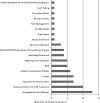Learning by doing: effectively incorporating ethics education into residency training
- PMID: 23179971
- PMCID: PMC3599016
- DOI: 10.1007/s11606-012-2277-0
Learning by doing: effectively incorporating ethics education into residency training
Abstract
Background: Medical ethics is a critical component of the curriculum for clinical trainees. Educational initiatives should adapt content to participants' experience in order to ensure relevance and retain their interest.
Aim: To develop and evaluate an experiential educational program for physicians.
Setting: Academic medical center.
Participants: Senior internal medicine residents (n = 40).
Program description: A case-based didactic program was designed in which each resident shared a difficult ethics case from their clinical experience. We created a curriculum around these cases involving formal didactics as well as open-ended discussion and summarized the ethical issues most relevant to the participants. A course survey was administered based upon the validated Students' Evaluation of Educational Quality (SEEQ).
Program evaluation: Common issues raised included surrogate decision-making (18 %), refusal of treatment (14 %), capacity/informed consent (10 %), and medical futility (10 %). Mean SEEQ subscale scores for learning value, organization/clarity, group interaction, breadth of coverage, and assignments/readings were 4.5 (maximum possible score 5). Residents unanimously rated the course overall as good/very good, and all agreed or strongly agreed that the course was useful and its structure effective.
Discussion: An experiential case-based didactic program in medical ethics engaged adult learners and facilitated a comprehensive and clinically relevant educational initiative.
Figures
References
-
- Accreditation Council for Graduate Medical Education (ACGME) Program Requirements for Internal Medicine. 2009 edition; accessed 26 October 2012. http://www.acgme.org/acgmeweb/Portals/0/PFAssets/ProgramRequirements/140....
MeSH terms
LinkOut - more resources
Full Text Sources


